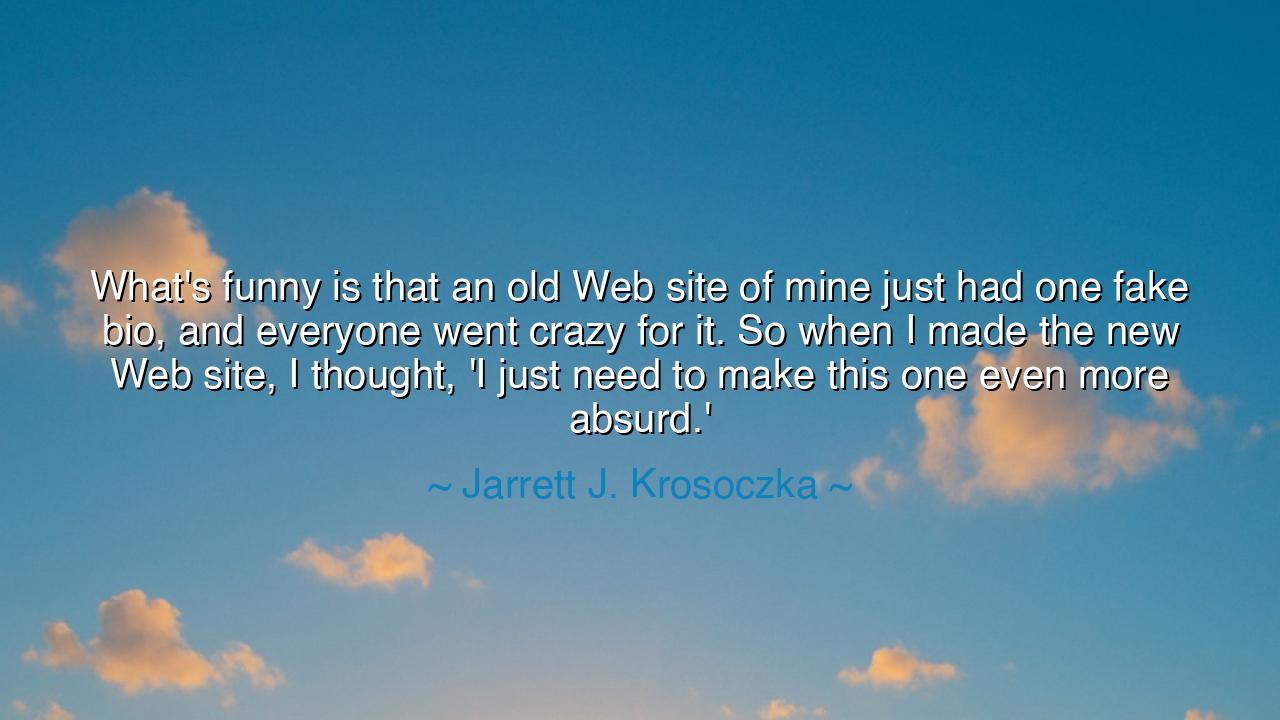
What's funny is that an old Web site of mine just had one fake
What's funny is that an old Web site of mine just had one fake bio, and everyone went crazy for it. So when I made the new Web site, I thought, 'I just need to make this one even more absurd.'






In the words of Jarrett J. Krosoczka, “What’s funny is that an old Web site of mine just had one fake bio, and everyone went crazy for it. So when I made the new Web site, I thought, ‘I just need to make this one even more absurd.’” — there breathes not only humor, but wisdom disguised in laughter. Beneath the jest lies a meditation on perception, truth, and the strange dance between the artist and the audience. Krosoczka, a creator known for his wit and imagination, reveals through this simple tale the eternal paradox of art: that sometimes, it is the fiction, not the fact, that captures the world’s attention — and that through absurdity, one can often tell deeper truths than through solemnity.
The meaning of this reflection extends far beyond a playful anecdote. When Krosoczka says that people “went crazy” over his fake bio, he is pointing to a profound truth about human nature — our fascination with stories, our craving for myth, and our eagerness to believe in what entertains us. The public, he observes, did not rally around his real life, but around the imagination he offered them. So, when he decided to make his new bio “even more absurd,” it was not an act of deception, but of artistic rebellion — a recognition that life itself is often stranger than fiction, and that the artist’s role is not merely to record truth, but to play with it, to bend it into shapes that awaken wonder, laughter, and reflection.
In this way, Krosoczka’s humor touches upon a very ancient form of wisdom — that of the trickster, the sacred fool who teaches truth through jest. The philosophers of old knew this well. Diogenes of Sinope, the Cynic philosopher, once carried a lamp through the streets of Athens in broad daylight, claiming to be searching for an “honest man.” The people laughed — yet behind the absurdity lay a razor’s edge of truth: that honesty is rare, and that illusion governs much of life. So too does Krosoczka’s absurd “fake bio” serve as a mirror to society — showing us that people often prefer the story of a person over the person himself, the myth over the man. The laughter it provokes is not empty; it is a gentle reminder of our own willingness to mistake fiction for truth.
The origin of Krosoczka’s insight arises from his life as a storyteller and artist — a man who has devoted his work to capturing the humor and honesty of childhood imagination. His encounter with the “fake bio” episode taught him something profound about audience and authenticity: that sometimes, the imagination communicates reality more deeply than facts ever could. For what is a bio, if not an attempt to define a human being — a creature far too complex to be captured in words? By exaggerating his own image, by making himself “more absurd,” Krosoczka does not hide from the truth; he celebrates the impossibility of fully expressing it.
This paradox — that truth is found through exaggeration — is a theme as old as storytelling itself. The poet Homer, in composing his tales of gods and heroes, did not aim to record history, but to reveal the moral and spiritual essence of humankind. The feats of Achilles and Odysseus may be fantastical, but within them lies a truth about courage, pride, and the restless human heart. So too does Krosoczka’s “absurd bio” express something essential: that life, when viewed honestly, is a blend of comedy and chaos, of invention and sincerity. To make his bio “even more absurd” is to lean fully into the artistry of existence, to embrace life’s own theatricality.
The lesson we draw from this is both humbling and freeing: that we should not cling so tightly to appearances, nor take ourselves too seriously. The world is filled with those who chase the illusion of control, who build their lives upon rigid identities and fixed narratives. Yet, as Krosoczka teaches, freedom is found in playfulness. To exaggerate oneself, to laugh at one’s image, is to rise above vanity and ego. When we allow absurdity into our lives, we invite joy — and in joy, we find wisdom. The one who can laugh at himself cannot be conquered by fear or pride, for he knows that all life is a grand, shifting story.
Therefore, my friends, follow the example of Jarrett J. Krosoczka: do not fear the absurd, but embrace it as a path to understanding. Be willing to turn your seriousness into laughter, your mistakes into art, your stories into mirrors of truth. The world will always “go crazy” for illusion — so let your illusions be beautiful, honest, and free. Let them reveal, not conceal, the deeper humor of being human.
For in the end, as Krosoczka reminds us, it is not the solemn face of truth that captures hearts — it is the wink, the grin, the spark of mischief that reminds us that life, in all its strangeness, is best lived with a little absurdity and a great deal of laughter.






AAdministratorAdministrator
Welcome, honored guests. Please leave a comment, we will respond soon